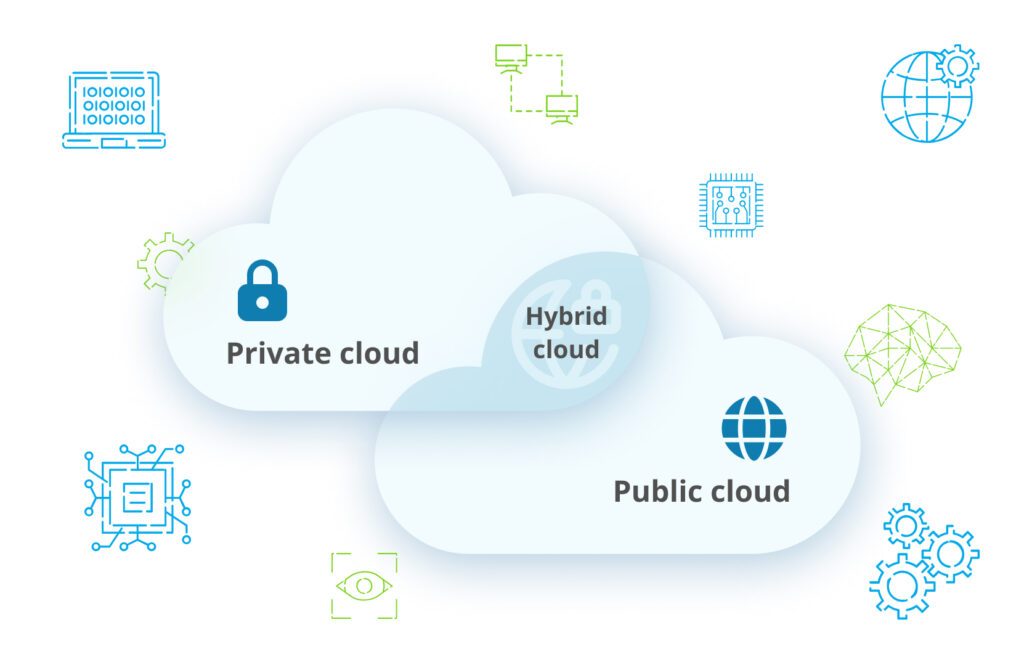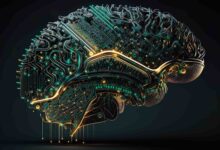Author: Talabuyev Y.
According to IBM’s report “The Data Story: The Power of Hybrid Cloud and Artificial Intelligence,” generative AI has become the top strategic priority for most IT departments in the world’s largest companies. Nearly all of these companies, IBM claims, have chosen hybrid cloud as the foundation for their digital transformation. This choice is driven by the fact that hybrid cloud is ideally suited to enhance the flexibility, security, and scalability of IT infrastructure while also unlocking the potential of generative AI. Let’s delve into the reasons behind the emergence of this powerful tandem and explore how businesses can maximize its benefits.
- How Businesses Are Adopting Generative AI
- Why Companies Choose Hybrid Cloud for AI Workloads
- Enhanced Security and Compliance
- Sustainable Development
- Reimagining Hybrid Cloud in the Era of GenAI
How Businesses Are Adopting Generative AI
The pace at which generative AI is being integrated into businesses is remarkable: the global market for generative AI is expected to reach $66.62 billion by the end of the year and exceed $1.3 trillion by 2032, according to forecasts from Statista and Bloomberg Intelligence. McKinsey further estimates that the economic impact of implementing this technology could range from $6.1 to $7.9 trillion annually.
Companies worldwide are eager to start using AI tools in their operations as quickly as possible, but they are not always prepared for the rapid growth in data volumes that comes with it. As a result, implementing an AI strategy often requires a reassessment of the current IT infrastructure—starting with evaluating computational power and storage capacities. It’s crucial not only to consider where the data is stored—whether in a local data center or with a reliable cloud provider—but also how quickly it can be accessed and how secure it is. This is where hybrid cloud comes into play: it not only enhances the performance and reliability of the infrastructure but also provides the flexibility that is essential for handling AI workloads.
As of 2024, more than half (56%) of large companies have either begun or already implemented a hybrid cloud strategy, according to Radix.
Why Companies Choose Hybrid Cloud for AI Workloads
Below, we have outlined the key reasons why hybrid cloud infrastructure is increasingly becoming the preferred choice for hosting workloads related to generative artificial intelligence.
Enhanced Security and Compliance
Security and compliance are critical concerns when deploying AI workloads in the cloud, and for good reason. On one hand, artificial intelligence processes vast amounts of data, which may include sensitive information such as personal, biometric, or medical data. On the other hand, cloud environments, like local data centers, can be vulnerable to various threats. According to a survey conducted by IBM, 45% of respondents cited cybersecurity concerns as the primary obstacle to adopting generative AI.
Hybrid cloud solutions allow companies to distribute workloads between on-premises (or private) and cloud environments in a way that minimizes the risks of data loss or breaches. This approach offers a balanced strategy, leveraging the strengths of both private and public infrastructures to ensure that sensitive data remains secure while still benefiting from the scalability and flexibility of the cloud.

Colobridge’s Expert:
“One-third of our clients operate in fintech and investment sectors, which are among the most heavily regulated industries. Therefore, we aim to optimally distribute workloads—not only to prevent the interruption of critical processes but also to provide additional protection for sensitive data. Our clients have the flexibility to choose which business applications will run on physical IT infrastructure (whether owned or leased), in a public or private cloud. This same approach is applied to workloads associated with generative AI as well.”
Sustainable Development
The rise of generative AI has led to an increase in data volumes, which can pose a challenge for companies aiming to reduce their environmental impact, particularly concerning greenhouse gas emissions. With the right tools, hybrid cloud can support a company’s sustainability efforts. For instance, offloading less critical workloads to the public cloud can help reduce electricity consumption during periods of low IT service demand. Additionally, placing data as close as possible to the locations where it is processed improves logistics by eliminating the need to transmit large volumes of data over long distances, which also reduces energy consumption.
Reimagining Hybrid Cloud in the Era of GenAI
Shawn D’Souza from IBM Consulting asserts that not all companies achieve the expected outcomes from cloud transformation, even if they initially chose a hybrid cloud strategy. This often happens due to a rush for “quick wins,” leading to increased complexity in IT infrastructure and higher maintenance costs. Combined with the ever-growing workloads generated by generative AI applications, this can pose significant challenges for businesses.
To avoid such issues, Shawn D’Souza advises companies to approach the placement of workloads in a hybrid cloud with careful consideration. This involves taking into account corporate use cases for GenAI, the reliability and scalability requirements of cloud applications, and the company’s financial capacity, as the costs of IT infrastructure can escalate.
IBM offers several recommendations for building a hybrid cloud that effectively supports AI workloads:
- Invest in powerful graphics processors that ensure high performance for AI applications.
- Implement robust security protocols, carefully assess risks and regulatory compliance, and standardize the use of IT security tools across different environments.
- Unify tools, environments, and IT stacks to enable efficient operation and further scaling of AI applications in the hybrid cloud.
Colobridge’s Expert:
“For companies eager to leverage the capabilities of generative AI, achieve quick results, and stay ahead of the competition, we offer a ready-made solution on the Colobridge platform—AIaaS, or ‘Artificial Intelligence as a Service.’ This high-performance infrastructure enables real-time batch data analysis, allowing businesses to make informed decisions based on data analytics and increase their return on investment by enhancing the effectiveness of marketing activities and sales.”
To learn more about the possibilities of hybrid cloud, leveraging generative AI solutions, and data management for building stronger customer relationships, consult the experts at Colobridge.





